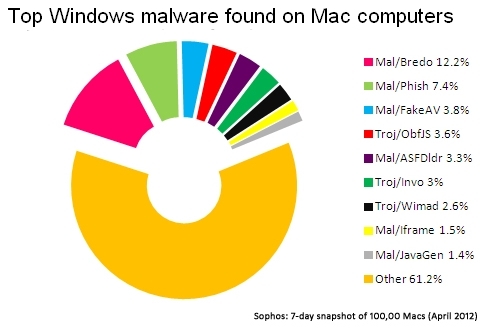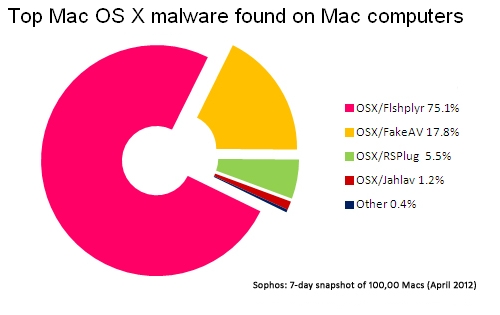Macs may not get PC viruses, but they sure can spread them
 What do sexually transmitted diseases and Mac viruses share in common? Surprisingly lots, according to security software developer Sophos. People can spread both without exhibiting symptoms, and the infection rates for "Macs carrying malware and level of Chlamydia infection amongst young people" are about the same.
What do sexually transmitted diseases and Mac viruses share in common? Surprisingly lots, according to security software developer Sophos. People can spread both without exhibiting symptoms, and the infection rates for "Macs carrying malware and level of Chlamydia infection amongst young people" are about the same.
Say what? That's the question asked in BetaNews group chat this morning about the seemingly strange correlation. But it makes sense to me. My colleague Tim Conneally gets it, too. He observed (after doing a little research): "One in 4 people with Chlamydia have no symptoms. They're saying it's spreading but not affecting the host". That's exactly Sophos' point. The firm found a shocking number of Macs infected with PC viruses, in a 100,000 sampling. The Macs are immune but can infect Windows PCs.
Not long ago, Apple tweaked its OS X security page by removing something: "Mac OS X doesn't get PC viruses". That's absolutely true. Most viruses are designed for Windows and, therefore, don't infect Macs. But as the Sophos study shows, Macs sure can carry Windows viruses. Sophos finds that one in five Macs carry Windows malware, which can be spread by email and other means. One in 36 -- that's 2.7 percent -- are infected with Mac malware.
"Amazingly, some of the malware discovered by Sophos on the 100,000 Mac computers sampled dates back to 2007, and would have been easily detected if the users had run an anti-virus sooner", Graham Cluley, Sophos senior technology consultant, observes.
Like Windows, "malware can spread onto Macs via USB drives, email attachments, website download, or even a silent drive-by installation where the user doesn't realize their Mac's security has been subverted", Cluley explains. "Some Apple fans might feel relieved that they are seven times more likely to have Windows malware on their Macs than Mac OS X-specific threats, but they shouldn't be".
The recent Flashback Trojan, which infected 700,000 Macs and may still persistent on 500,000, is good example. That's not some asymptomatic Windows malware but something catchable by OS X.
"Sadly, cybercriminals view Macs as a soft target, because their owners are less likely to be running anti-virus software", Cluley warns. According to complimentary BetaNews polls, 74 percent of respondents do not have anti-malware installed on their primary Macs, while 92 percent of Windows users do.
"Bad guys may also believe that Mac users are likely to have a higher level of disposable income than the typical Windows user" Cluley speculates. "So, they might believe the potential for return is much higher". I've often wondered about that and am surprised attacks against Macs aren't greater because of it.

Linking Mac and Chlamydia infection-rates is brilliant. For one, it's a startling, memorable analogy. For another, the analogy links together pervasive behavior about taking unnecessary risks against viruses -- being unprotected. Finally, there is the youth angle, since the same demographic often seen using Macs also has high rates of STD infection.
Cluley makes the important point: "Just like malware on your computer, Chlamydia commonly shows no obvious symptoms. But left undetected Chlamydia can cause serious problems, such as infertility". He notes that some countries have created national screening programs to test people under 25, annually, for Chlamydia.

Maybe there should something like this for Macs. Once a year, Apple, working with security software developers, offers a free check up to scan and rid Macs of malware -- with special emphasis on clearing out the crap spread to Windows users.
Photo Credit: Vasilchenko Nikita/Shutterstock
